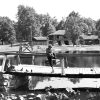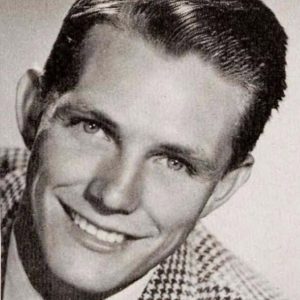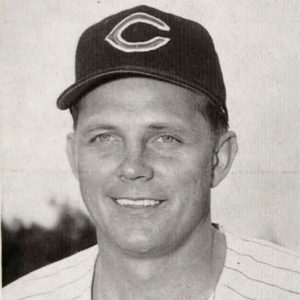calsfoundation@cals.org
Mel McGaha (1926–2002)
Described as “extremely quiet off the athletic field and a fiery demon on it,” Mel McGaha was a three-sport athlete at the University of Arkansas (UA) in Fayetteville (Washington County) who excelled in football, basketball, and baseball. After college, he played two sports professionally, eventually reaching baseball’s major leagues as a manager in the 1960s.
Fred Melvin McGaha (pronounced Mc-Gay-Hay) was born on September 26, 1926, in Bastrop, Louisiana, to Fred and Ethie McGaha; his father was a railroad worker, and his mother was a homemaker.
McGaha grew up in Mabelvale (Pulaski County), where he played basketball and baseball for Mabelvale High School. Enrolling at UA at just shy of seventeen, he soon added football to his repertoire, serving as what he described as “cannon fodder” due to wartime shortages of players.
McGaha earned nine letters across three sports at UA and became one of the few Razorbacks to letter in three sports in one year. His most notable years on the hardwood came in 1943–1945, when he was a member of successful basketball teams. He found gridiron success in 1946, when he played as a reserve on the first Razorbacks football team to make the Cotton Bowl.
McGaha’s collegiate career was interrupted by a nine-month stint in the U.S. Army Air Corps. He was discharged in November 1945, not long after the end of World War II, and married Christina Lansford that same year; they had two children. He returned to serve as a team captain for the 1947 football team. That year, Arkansas was invited to play in the Dixie Bowl in Birmingham, Alabama. UA won 21–19, securing its first bowl win in school history, thanks in part to McGaha, who returned an interception seventy yards for a touchdown, setting school records.
After graduating with a degree in education, McGaha signed three professional sports contracts: to play football for the Los Angeles Rams, baseball for the St. Louis Cardinals, and basketball for the New York Knicks.
Thinking he could not make it in all three due to the overlapping seasons, McGaha played baseball and basketball across 1948–1949. But while he was playing in the minor leagues, his baseball career was derailed by a deadly vehicle collision. His team’s bus collided with an ice truck, killing the manager, four players, and the truck’s driver. McGaha was one of thirteen players injured; only three ever played baseball again, and McGaha was not one of those.
His sights were now set on making it to the majors as a manager. In the meantime, McGaha spent winters coaching basketball, had brief stints with high schools in northwestern Arkansas, and coached one season at Arkansas A&M (now the University of Arkansas at Monticello).
In 1962, at thirty-five, he became the youngest active manager in the majors when he was hired to lead the Cleveland Indians. The team was competitive in the first half of the season, holding a 48–37 record at the All-Star break—tied for first with the eventual World Series champion New York Yankees—but faded down the stretch. The team finished 78–82 and in sixth place, and McGaha was fired with two games left in the season.
A year later, McGaha was hired to manage the Kansas City Athletics. He took over a 17–35 squad in June, and went 40–70–1, as the team finished last. He returned the next year, lasting only twenty-six games before being replaced. His overall managerial record in the majors was 123–173.
McGaha returned to manage minor league teams after his time in Kansas City. He had one final stint in the majors, with the Houston Astros, as a coach. In the early 1970s, he became director of parks and recreation for the city of Shreveport, Louisiana. He also worked for Bossier City’s recreation department. He moved to Disney, Oklahoma—later referred to as his retirement home—in the early 1980s.
McGaha’s athletic prowess—especially his being one of the last three-sport athletes in the Southwest Conference—was recognized with induction into the Arkansas Sports Hall of Fame in 1970 and the University of Arkansas Sports Hall of Honor in 1990. He died in Tulsa, Oklahoma, on February 3, 2002, and was cremated.
For additional information:
Bailey, Jim. “McGaha Jack of All Trades, Master of Some.” Arkansas Democrat-Gazette, February 26, 2002, p. 2C.
———. “McGaha ‘Came to Beat You.’” Arkansas Gazette, January 14, 1970, p. 3B.
———. “McGaha Ran.” Arkansas Democrat-Gazette, May 10, 1995, p. 1C.
DeFillipo, Larry. “Mel McGaha.” Society for American Baseball Research. https://sabr.org/bioproj/person/mel-mcgaha/ (accessed January 21, 2025)
Harris, Jim. “6 Hogs to enter Hall of Honor.” Arkansas Gazette, September 8, 1990, p. 3D.
“McGaha Named Texas League Skipper at 26.” Oakland Tribune, December 6, 1953.
“Mel McGaha.” Baseball-Reference.com. https://www.baseball-reference.com/managers/mcgahme99.shtml (accessed January 21, 2025).
“Melvin McGaha Will Rejoin Porker Cagers.” Houston Chronicle, November 9, 1945, p. 34.
Obituary of Fred Melvin “Mel” McGaha. Arkansas Democrat-Gazette, February 19, 2002, p. 10.
Van Thyn, Nico. “McGaha’s Death Marks End of Era.” Shreveport Times, May 2, 2002.
Brandon Howard
Fayetteville, Arkansas








Comments
No comments on this entry yet.